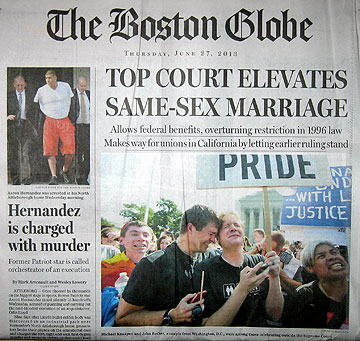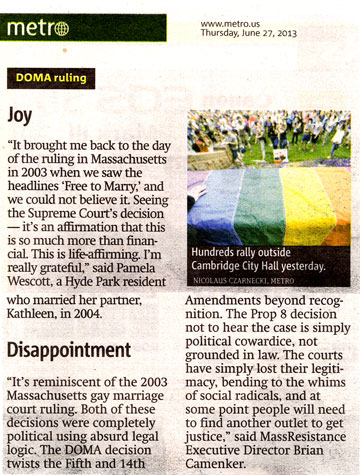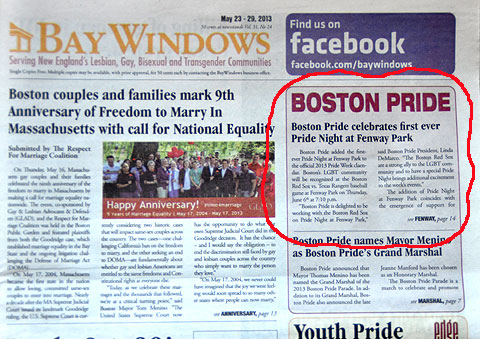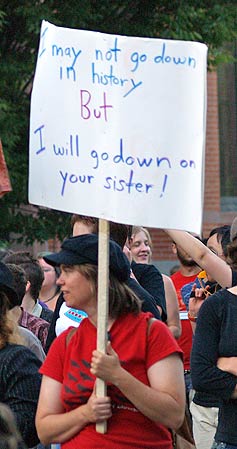Wednesday the US Supreme Court gave the radical homosexual movement in America a big victory.
Taken in the context of human history this was incomprehensible. Any other generation, looking at this, would think the Justices had lost their minds. First and foremost, it shows that the homosexual movement can now use the courts to accomplish many of their goals, no matter how outlandish and undemocratic. And down the road the same legal "logic" can almost surely be used to declare laws against polygamy and polyandry unconstitutional.
| The mainstream media reacted predictably. |  |
Back in April, right after their Supreme Court hearings, we published an analysis of Prop 8 and DOMA "gay marriages" cases as it looked then. Here is our assessment of what happened Wednesday.
The DOMA case
The Supreme Court ruled 5-4 that Section 3 of the Defense of Marriage Act (DOMA) is unconstitutional. (Section 3 defines marriage as one man and one woman for federal government purposes.) Specifically, they said that treating "legally married same-sex couples" differently is a violation of the Fifth and Fourteenth Amendments of the US Constitution.
Read the DOMA ruling (77 pages) HERE
What's particularly disturbing is the twisted legal logic the Court used to come to these conclusions. They basically lifted the talking points of the homosexual "gay marriage" lobby. The Court created a "class" of people -- homosexuals -- and declared that their behaviors and "unions" were no different than any other. And the pro-family lawyers did nothing to effectively counter those assumptions, so the Court basically ran with it and extrapolated absurd Constitutional "rights" from it.
So we are left with Supreme Court language that will surely haunt us more down the road.
And what's next?
In the near term, this will radically change things on a federal level, especially given the Obama Administration's enthusiasm for pushing "gay marriage." As we outlined in our April 8 report, overturning Section 3 of DOMA will accomplish the following:
(1) All federal benefits. It will require the federal government (funded by taxpayers in all 50 states) to include homosexual "marriages" in all federal benefits. This includes Social Security, federal pensions, Medicare, Medicaid, Veterans' benefits, and everything else involving marriage, including filing jointly on Federal income taxes.Down the road: Legal challenges to other states' marriage amendments. This also opens the door for homosexual activists to go get friendly federal judges across the country to go state by state and strike down each state's constitutional amendments banning same-sex "marriage." They will cite the US Supreme Court's use of the 5th and 14th Amendments to support "gay marriage" rights and work to extrapolate that to individual states.
(2) All federal programs. It also includes access to federal programs and other things run or controlled by the federal government, such as housing, federal loans, passports, health insurance, military housing, burial in military cemeteries, etc. Thus, the federal government would recognize homosexual behavior as equal to regular marriage throughout the range of all its activities.
(3) But even more frightening: Any federal funded contract, program, or activity. Given the wording of the decision it will also likely extend to any activities that receive federal funding, such as state programs, college programs, and virtually anything else involving federal money, such as federal contracts. We believe that the Obama administration will use this as a lever to accelerate the forced equalization of homosexuality with heterosexuality in all federal activities or anything connected to federal money -- similar to the way it did in the military with the repeal of "Don't Ask Don't Tell." Judging from Obama's statement celebrating the ruling, we can expect them to move as fast as possible.
A fiery dissent from Justice Scalia
Also included in the ruling is a fiery dissent from Justice Scalia, who questions the Court's constitutional ability to decide these kinds of cases. Scalia says:
This case is about power in several respects. It is about the power of our people to govern themselves, and the power of this Court to pronounce the law. Today’s opinion aggrandizes the latter, with the predictable consequence of diminishing the former. We have no power to decide this case. And even if we did, we have no power under the Constitution to invalidate this democratically adopted legislation. The Court’s errors on both points spring forth from the same diseased root: an exalted conception of the role of this institution in America.Thus Scalia brings up a larger and very serious issue -- Can the Court pronounce the law? -- that is the genesis of the despotic judicial activism in America and should have been addressed a long time ago, but particularly now.
The Court is eager -- hungry -- to tell everyone its view of the legal question at the heart of this case. Standing in the way is an obstacle, a technicality of little interest to anyone but the people of We the People, who created it as a barrier against judges' intrusion into their lives. They gave judges, in Article III, only the "judicial Power," a power to decide not abstract questions but real, concrete "Cases" and "Controversies."
The Prop 8 Case
The Prop 8 case is a little more complicated. The Court accepted the case and heard the arguments. Then they used a technicality to avoid making a ruling at all.
In a 5-4 decision, the Court said that the plaintiffs in the case didn't have standing to file the original suit to overturn the Federal District Court decision in August, 2010, which had ruled California's Prop 8 (which created a state constitutional amendment defining marriage as between only one man and one woman) to be in violation of the US Constitution. That was unsuccessfully appealed in the 9th Circuit Court, and then went to the US Supreme Court.
This was the problem: Normally, the plaintiffs would be the state officials, defending the law against the court's ruling. But in a very unusual move, California's pro-gay Governor and Attorney General refused to challenge the lower court decision. So a group of people who had organized the Prop 8 movement filed the suit themselves to defend the law. The Federal justices had no problem with that, and California law allows it. But the Supreme Court Justices said that those plaintiffs were not directly "affected" by the lower court ruling, and the Supreme Court's procedure was not to grant them standing. However, as the Court's minority opinion pointed out, they were considered to have standing under California laws, so it should have been allowed.
This appears to be an act of political cowardice on the part of the Supreme Court more than anything else. Everyone had expected them to go ahead and rule one way or the other, rather than find a way to avoid the issue. An obvious question, also, is: Why didn't the pro-family lawyers anticipate that, and include someone with obvious standing, such as a town clerk?
In addition, many believe that Justice Roberts should have recused himself from the Prop 8 case entirely. As was reported in CNSnews, Roberts' first cousin is a lesbian living in California who wants to get "married" to her female partner. Roberts gave her a front-row seat at the Supreme Court DOMA and Prop 8 hearings, and she wrote on a lesbian website that she was confident Roberts would rule "in favor of equality." Had Roberts recused himself, it would have been a tie.
Read the Prop 8 ruling (35 pages) HERE
What will happen next?
This ruling means that the Federal Ninth Circuit Court of Appeals ruling against Prop 8 -- which affected all of California -- is vacated, but the lower Federal District Court ruling against Prop 8 stands. However, that Federal District only covers parts of northern California. (So in that sense, the DOMA ruling has a positive aspect!) What about the other parts of California? Right now, that's up in the air. Technically, Prop 8 should be in effect in the rest of California.
We think the most likely thing to happen is that the Governor and Attorney General will simply ignore the "district" problem and start issuing "gay marriage" licenses throughout California. This would be an outrage, but not surprising. In fact, they have already announced their intentions to move in that direction.
Re-file the suit? It would appear that the a plaintiff with standing could re-file the appeal in the 9th Circuit Court. Such a plaintiff might be a town clerk who would be "affected" by the marriage law change. And hopefully they would get different judge than the "out" homosexual Judge Vaughn Walker. But at this point, we haven't heard anything along those lines.
 |
Differing opinions. The Boston Metro newspaper published the reactions to the Doma ruling from a lesbian activist -- and MassResistance. |
How the pro-family movement botched these cases
We are reluctant to sound unkind to the pro-family legal people who worked hard on these cases. But this is such a horrible outcome that something must be said.
". . . the abominable and detestable crime against nature . . ."
-- description of homosexuality in current Massachusetts State Law
Both of these cases suffered from an unaggressive and short-sighted approach that bordered on incompetence. The pro-family side did not present a credible case in either of these cases. They were deathly afraid that telling the truth about homosexuality might offend someone. By not effectively countering the absurd arguments and assumptions by the homosexual movement, they made it easy for the judges to rule as they did.
The Prop 8 case
In the Federal District Court case in 2010 the homosexual lobby's lawyers bombarded the court with their well-honed talking points on "marriage", "family", the welfare of children of same-sex couples, and the like. They portrayed same-sex "marriages" as natural constructs that conservatives don't happen to like.
But as we reported at the time, the pro-family lawyers refused to consider using the medical and psychological dangers and moral issues surrounding homosexuality as a counter-arguments. Instead they came up with soft arguments like "every child needs a father and a mother." In fact, the lawyers on our side accepted California's civil union law, which allows homosexual "parenting," as a legitimate compromise. This made their "mother and father" argument impossible to defend.
The handling of the case was so bad that the Federal District Court judge -- the "out" homosexual judge -- rebuked the pro-family lawyers for the lack of evidence they presented! It was almost as if the judge had no choice but to rule against us, based on what he had to work with.
When it got to the Supreme Court, it was no better. Our lawyers gave no credible reasons why same-sex couples should even be treated differently, much less any kind of immoral or destructive situation.
Thus, the Court's Prop 8 ruling observed:
The Ninth Circuit concluded that "taking away the official designation" of "marriage" from same-sex couples, while continuing to afford those couples all the rights and obligations of marriage, did not further any legitimate interest of the State. . . . Proposition 8, in the court's view, violated the Equal Protection Clause because it served no purpose "but to impose on gays and lesbians, through the public law, a majority's private disapproval of them and their relationships."In other words, our "private disapproval" of them is all we could muster, and in the Courts eyes this now constitutes needless bigotry.
We pointed out long ago (2001-2007 in Massachusetts) that to commpromise by accepting the concept of "civil unions" would irrevocably harm our side's ability to argue against the later demands for "full equality" which were certain to follow.
The DOMA case
The DOMA case was even worse. Issues such as the morality of homosexuality, the perversion of the behavior itself, the absurd "equality" of homosexual relationships to heterosexual relationships, the bizarre effects on children having "two dads", and the overwhelming medical and psychological problems associated with homosexuality were the underlying reasons for the law's original passage. These are all legitimate issues. But the pro-family lawyers were afraid to use these arguments.
At the hearing Justice Kagan herself brought up the law's original morality argument, but our side wouldn't touch it. In the end, if we don't even mention any of these issues, then why should the Justices consider them?
Thus, the Justices accepted the premise that homosexuals are a "class" of people who are born that way, and that there is nothing immoral or perverted (or destructive) about that behavior. It's just something conservatives don't like, they've concluded. And -- like the Massachusetts Goodridge "gay marriage" ruling in 2003 -- that opened the Pandora's box of new Constitutional interpretation.
The Judges' opinion used twisted legal reasoning that enforcing the normal definition of marriage is in fact a terrible violation of the US Constitution's Fifth Amendment ("no person shall be deprived of life, liberty, or property, without due process of law") and 14th Amendment ("equal protection under the law").
Thus, the DOMA court ruling states:
The [US House of Representatives] concluded that DOMA expresses "both moral disapproval of homosexuality, and a moral conviction that heterosexuality better comports with traditional (especially Judeo-Christian) morality." The stated purpose of the law was to promote an "interest in protecting the traditional moral teachings reflected in heterosexual-only marriage laws." Were there any doubt of this far-reaching purpose, the title of the Act confirms it: The Defense of Marriage . . .This is all legal nonsense. But this is where we're at now.
[T]he principal purpose and the necessary effect of this law are to demean those persons who are in a lawful same-sex marriage. This requires the Court to hold, as it now does, that DOMA is unconstitutional as a deprivation of the liberty of the person protected by the Fifth Amendment of the Constitution.
The liberty protected by the Fifth Amendment's Due Process Clause contains within it the prohibition against denying to any person the equal protection of the laws. While the Fifth Amendment itself withdraws from Government the power to degrade or demean in the way this law does, the equal protection guarantee of the Fourteenth Amendment makes that Fifth Amendment right all the more specific and all the better understood and preserved.
The class to which DOMA directs its restrictions and restraints are those persons who are joined in same-sex marriages made lawful by the State. DOMA singles out a class of persons deemed by a State entitled to recognition and protection to enhance their own liberty. It imposes a disability on the class by refusing to acknowledge a status the State finds to be dignified and proper. DOMA instructs all federal officials, and indeed all persons with whom same-sex couples interact, including their own children, that their marriage is less worthy than the marriages of others. The federal statute is invalid, for no legitimate purpose overcomes the purpose and effect to disparage and to injure those whom the State, by its marriage laws, sought to protect in personhood and dignity. By seeking to displace this protection and treating those persons as living in marriages less respected than others, the federal statute is in violation of the Fifth Amendment. This opinion and its holding are confined to those lawful marriages.
A larger problem in the conservative movement
The cowardly nature of the pro-family movement has wrought terrible consequences and continues to be a huge problem. The DOMA case represents the tip of the iceberg. This unwillingness to address the underlying issue of homosexuality itself -- the behavior, its associated health risks, the profound moral issues, and the "born gay" myth -- gives that movement free rein to continue its march through our institutions.
As comfortable an argument as it is, we must stop deluding ourselves that this war is about the definition of marriage or children needing both a mother and a father. It's a bare-knuckles battle about truth versus lies that we cannot afford to continue to lose.





















































































































